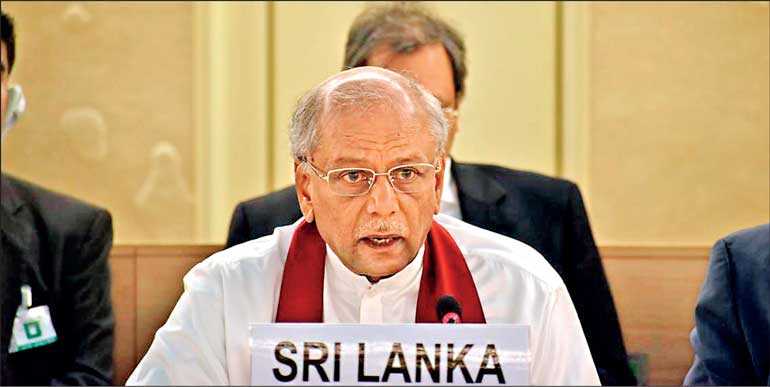Tuesday Feb 17, 2026
Tuesday Feb 17, 2026
Thursday, 25 March 2021 00:00 - - {{hitsCtrl.values.hits}}

Foreign Minister Dinesh Gunawardena was quick to laud the “support” rendered by the other nations in opposing this resolution. Unfortunately for the Minister, this opposition translated into only 11 countries voting against the resolution
 The successful adoption of the United Nations Human Rights Council (UNHRC) resolution titled ‘Promotion of Reconciliation Accountability and Human Rights in Sri Lanka’ is a wake-up call for the Government’s foreign policy experts.
The successful adoption of the United Nations Human Rights Council (UNHRC) resolution titled ‘Promotion of Reconciliation Accountability and Human Rights in Sri Lanka’ is a wake-up call for the Government’s foreign policy experts.
Sri Lanka’s foreign office faced its first major test this week with the vote at the 46th session of the UNHRC in Geneva. Presented with a resolution that called for the promotion of accountability and human rights, which the Government had chosen to reject, there was little expectation of any other outcome but one of successful adoption. With over 40 co-sponsors for the resolution, including the US and the UK, the possibility of a rejection of this resolution was minimal.
With 22 members, out of the 47-member council, choosing to vote in favour of the resolution, Foreign Minister Dinesh Gunawardena was quick to laud the “support” rendered by the other nations in opposing this resolution. Unfortunately for the Minister, this opposition translated into only 11 countries voting against the resolution. With 14 member states choosing to abstain from the vote, the Government has been left with a large “what-if” hanging over its conduct.
Lowest ever support for Sri Lanka
Irrespective of the Foreign Minister’s claims that the majority of the council supported the Government’s efforts to reject the resolution, history does not play in favour of the regime. Since 2009, and the first resolution tabled regarding Sri Lanka, this session saw the lowest number of countries supporting Sri Lanka.
In 2009 the Council adopted a resolution submitted by Sri Lanka which reaffirmed the country’s sovereign right. This was criticised by many as being a watered-down document which avoided the question of accountability. On that occasion a grand total of 29 countries supported the resolution. This started Sri Lanka’s post-war phase off on a positive footing.
Since then, Sri Lanka’s international engagement at the UNHRC has been less than ideal. 2012, 2013 and 2014 all saw resolutions adopted by the Council promoting accountability and transparency in the country while encouraging greater involvement by the international community. These resolutions lacked the support of the then Mahinda Rajapaksa Government. Support for Sri Lanka also saw a continual decline with the number of countries voting against the resolutions reduce from 15 to 13 and finally to 12 over the respective years.
Yahapalana approach
With Sri Lanka’s standing on the international stage suffering, the Yahapalana Government, which assumed office in 2015, chose to adopt a new stance, recognising that the continual rejection of the international community, and in doing so choosing to side with a single bloc, had left the country isolated and suffering.
Removals of the GSP+ by the EU and the fisheries export ban imposed by the EU had left the economy in tatters. The decision to co-sponsor a resolution with reaffirmed the Government’s commitment to accountability, while ensuring a domestic mechanism was adhered to, secured the unanimous support of the Council. For the next four years, Sri Lanka was no longer the focus of the UNHRC.
 Return to rejection
Return to rejection
In 2020, following the election of President Gotabaya Rajapaksa, the new Government returned to its tried and failed approach of rejection. Withdrawing the country from the resolution the previous Government had co-sponsored, the Rajapaksa administration announced that once again the direction of the country’s foreign policy was one of selective engagement.
President Rajapaksa enjoyed victory at the 2019 Presidential Election, and the subsequent 2020 General Election, on a platform of confrontational politics. Promising to be a strongman president, in the wake of the 2019 Easter Sunday attacks, President Rajapaksa’s approach has been met with a mixed response in the domestic sphere, with many voters left frustrated by the alleged deal-making amongst politicians, a “no-nonsense” President was what they were looking for.
Aggressive approach has failed
However, while this approach has paid dividends in the local context, internationally the regime’s aggressive approach has clearly failed.
With this resolution having been co-sponsored by the US and the European Bloc, opposition was expected. China, which has continually opposed moves it describes as encroaching on sovereignty, was able to muster support across Asia, while Russia’s opposition translated into support from Uzbekistan and members from the South American Bloc. However, with none of the other heavy weights on the council throwing their support behind the Government’s efforts to have it rejected, the resolution was comfortably adopted.
While the vote was watched closely by Sri Lanka, the repudiation of the resolution seemed to have always doomed the Government to failure. It has been proven, in the case of Sri Lanka, that engagement and cooperation is capable of yielding results. While the Foreign Minister’s claims that the resolution was opposed by the majority of the Council is not accurate, it does leave room for the Government to re-think its foreign policy strategy.
India and Japan
Both India and Japan, traditional allies of Sri Lanka, chose to abstain from this vote despite being co-sponsored by their own allies in the US and the UK. The Rajapaksa Government’s treatment of both these countries has been nothing short of second-class. India and Japan suffered the public humiliation of being thrown aside from a previously agreed upon development with the Sri Lankan Government of the Eastern Container Terminal. Without any warning, the respective countries learnt of the Government’s decision to cancel the agreement through media reports.
The Government’s handling of relations with India have been far from ideal. The announcement that a power project for the Northern Province would be awarded to a Chinese company did not go down well with New Delhi. Traditionally India has dominated the Northern and Eastern Provinces, as dictated by the unspoken geo-political roadmap of Sri Lanka. However, this decision to further align with China at the expense of India certainly did no favours to the
Rajapaksa administration.
In India’s statement prior to the vote on the resolution, it was made clear that it expected the Government to implement the 13th Amendment in its entirety. Previously the Minister of Public Security Sarath Weerasekara had publicly called for the abolishment of the Provincial Councils, leading to questions being raised over the administration’s commitment to the 13th Amendment.
While Sri Lanka’s engagement with India has been rocky since the new Government took power in 2019, the problems have been compounded by the fact that there has been an absence of a High Commissioner in India. Knowing that a resolution on the country was pending and the support of India was vital, the lack of emphasis placed on engagement with India by Sri Lanka has left many scratching their heads.
While Sri Lanka was unable to secure the support of either India or Japan, the Foreign Office was also unable to sway the votes of the African and Asian Blocs. With eight of the 13 states from Africa and five of the 13 states in Asia abstaining, the question that will now be posed to the Government is, why was it unable to secure their support?
Time to rethink strategy
With as many as 14 countries of the 47-member Council abstaining from the vote, opposition to Sri Lanka’s stance was as much supported by geopolitics as it was by the regime’s indifference to the international community. The decision by the Rajapaksa administration to withdraw from the previous resolution, which the country had co-sponsored, was a slap in the face of the Council. It demonstrated that the Government did not respect the Council, which it is a part of. It is little wonder that these countries, which showed they were opposed to a resolution which did not enjoy the support of the subject country, were unwilling to get behind Sri Lanka’s efforts.
The number of abstentions at this vote was the highest it has been for a resolution regarding Sri Lanka. Previously in 2014, 12 countries abstained, the following year the fresh co-sponsored resolution by Sri Lanka was adopted unanimously. While there is little doubt that geopolitics played its role in the support for this resolution, Sri Lanka’s confrontational approach alone is not yielding results. Perhaps the time has come for this Government to re-think its strategy and consider one of engagement.